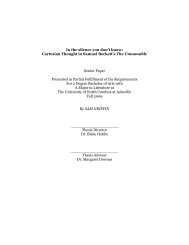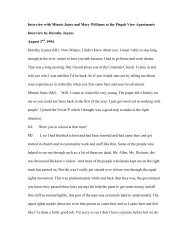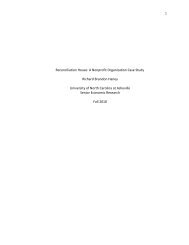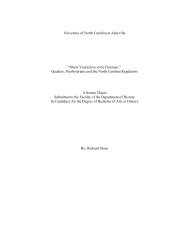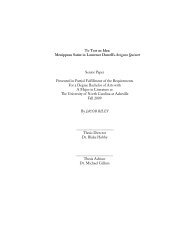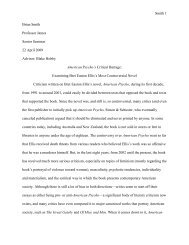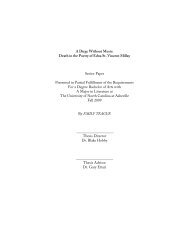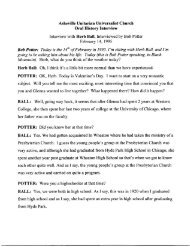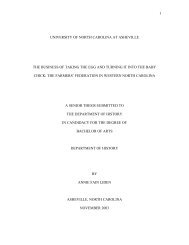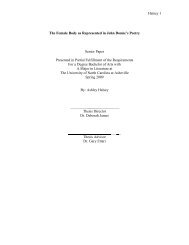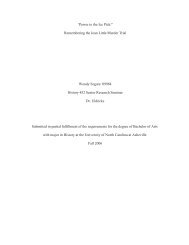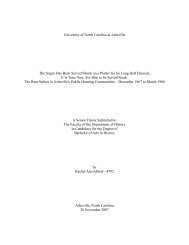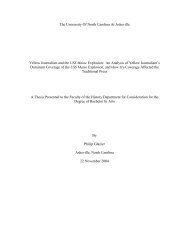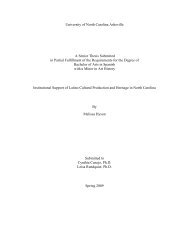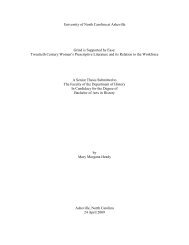Mark Twain's Writing During his Last Twenty Years: The Conflicts of ...
Mark Twain's Writing During his Last Twenty Years: The Conflicts of ...
Mark Twain's Writing During his Last Twenty Years: The Conflicts of ...
You also want an ePaper? Increase the reach of your titles
YUMPU automatically turns print PDFs into web optimized ePapers that Google loves.
Arghiere 22<br />
Despite some <strong>of</strong> its grim ramifications, Twain passionately defended <strong>his</strong> theory <strong>of</strong><br />
determinism until <strong>his</strong> death, steadfastly denying the compatibility <strong>of</strong> religious ideas with the<br />
scientific ideas which seem to have informed <strong>his</strong> theory. Although he attended church regularly<br />
for brief periods earlier in <strong>his</strong> life, Twain later insisted that “When religion and science elect to<br />
live together, it is a plain case <strong>of</strong> adultery” (Harnsberger 13). He likely held t<strong>his</strong> opinion, or one<br />
close to it, for at least the final twenty years <strong>of</strong> <strong>his</strong> life. While Twain was able to reason<br />
consistently in favor <strong>of</strong> the opinions and beliefs presented in <strong>his</strong> writing, some doubt exists as to<br />
whether he viscerally accepted them. “<strong>The</strong> very vehemence with which Twain supported<br />
determinism and denied free will operating through conscience and the Moral Sense,” as Parsons<br />
notes, “reveals unsureness” (71). Perhaps Twain’s uncertainty, if he indeed had any, towards the<br />
deterministic ideas in <strong>his</strong> works lay in their conflict with <strong>his</strong> moral principles. His frequent<br />
contemplation <strong>of</strong> solipsistic ideas, after all, would appear to suggest <strong>his</strong> dissatisfaction with <strong>his</strong><br />
deterministic doctrine. In <strong>his</strong> book Small is Beautiful: Economics as if People Mattered, Schumacher<br />
comments on the ambivalence—which Twain perhaps felt—<strong>of</strong> many towards the leading ideas<br />
<strong>of</strong> the nineteenth-century: “We have become confused as to what our convictions really are. <strong>The</strong><br />
great ideas <strong>of</strong> the nineteenth century may fill our minds in one way or another, but our hearts do<br />
not believe in them all the same. Mind and heart are at war with one another, not, as is<br />
commonly asserted, reason and faith” (98). For Twain, it seems, the more important battle was<br />
always that between reason and faith. Despite <strong>his</strong> despairing comments on the human race and<br />
on the universe, he never seems to acknowledge any tension between <strong>his</strong> convictions and desires.<br />
In fact, in What Is Man?, he trivializes beliefs as compared to temperament, thus removing any<br />
conflict between the two: “Beliefs? Mere beliefs? Mere convictions? <strong>The</strong>y are powerless. <strong>The</strong>y<br />
strive in vain against inborn temperament” (398). <strong>The</strong> irony <strong>of</strong> t<strong>his</strong> passage lies in Twain’s denial



